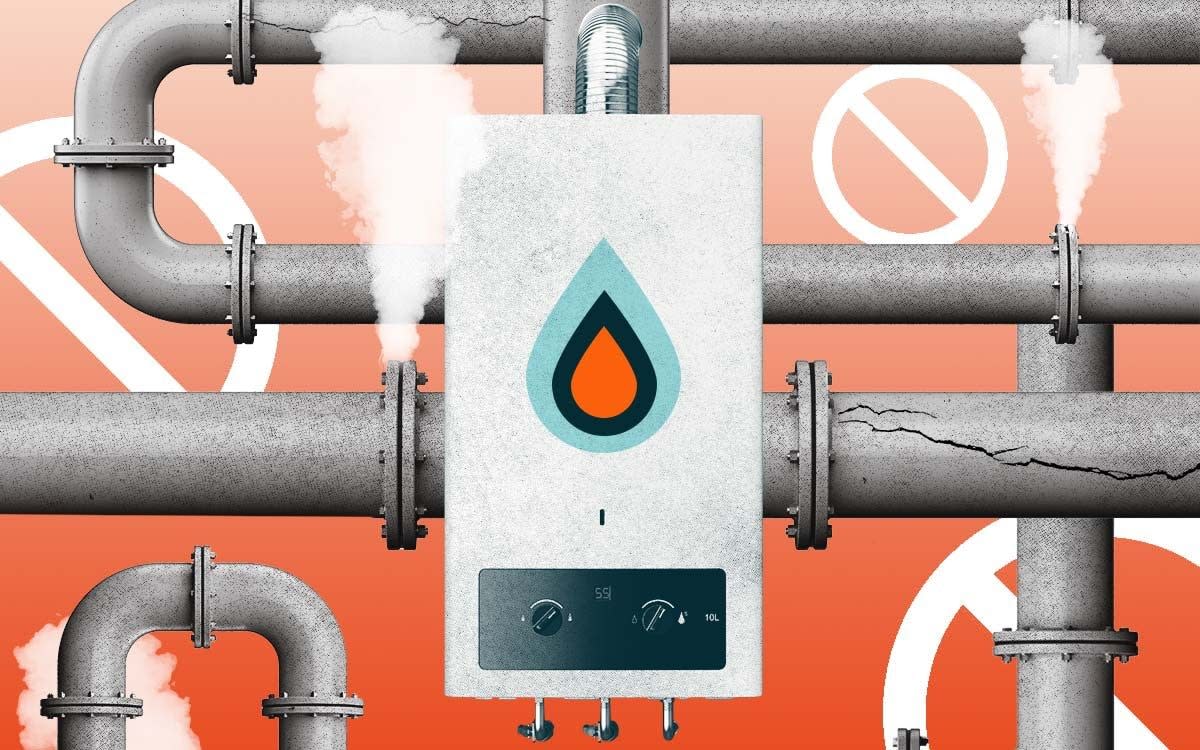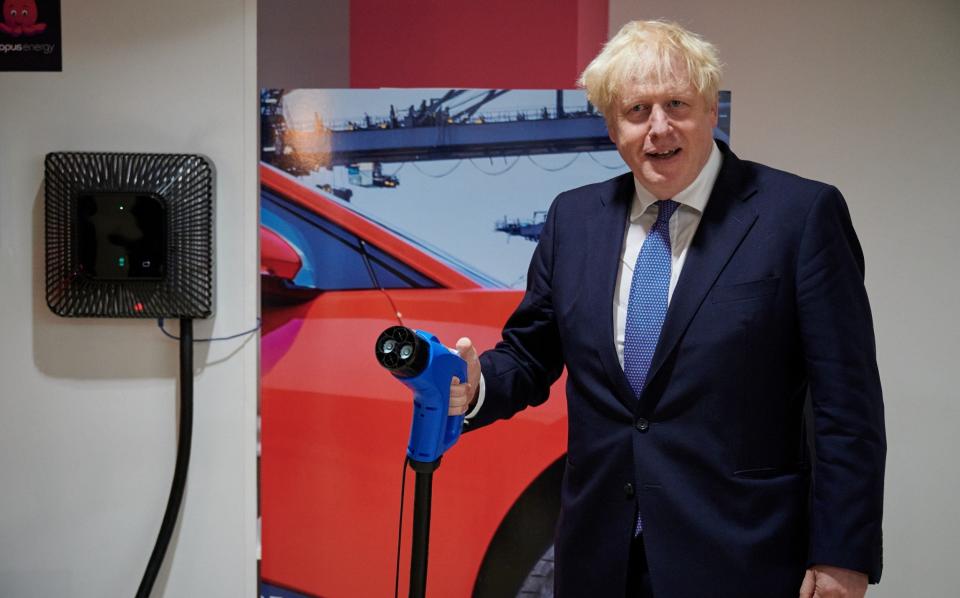New voucher scheme to replace gas boilers limited to just 90,000 households

- Oops!Something went wrong.Please try again later.
Only 90,000 households will get vouchers to help with the cost of removing their gas boilers, the Government will announce on Tuesday, as the door is opened to putting additional green levies on gas bills.
In one of a string of major climate change announcements, Boris Johnson will commit to the “ambition” of ending the sale of gas boilers in the UK from 2035.
To hit the target, a new Boiler Upgrade Scheme will be set up that gives people £5,000 vouchers to switch from gas boilers to heat pumps, which are less polluting.
The scheme, which initially lasts for three years from next April and applies to England and Wales, will be funded with £450 million. However, that means just 90,000 households can benefit.
For comparison, the Office for National Statistics estimated there were almost 28 million families in the UK last year.
Government sources on Monday night pushed back on suggestions the scheme was too limited, saying it was designed to “kickstart” demand for heat pumps.
Government ministers and some energy bosses believe in the coming years, the cost of a gas boiler and a heat pump will reach the same price point.
How heat pumps work
However, critics will question whether the voucher scheme will prove impactful given only a fraction of the country can benefit, with concerns that people who had already planned to switch will mainly benefit from the scheme.
The voucher scheme was just one part of the Heat and Buildings Strategy, due to be published on Tuesday, which will map out how the country will move away from polluting energy sources in homes and public buildings.
In total, £3.9 billion in new funding will be announced for five different schemes, much of it focused on improving energy efficiency in public schools, hospitals and libraries as well as social housing.
The Government will also publish its long-awaited net zero strategy, detailing the full spectrum of changes being adopted so that the UK can hit net zero carbon emissions by 2050, a flagship goal to tackle climate change.
The Prime Minister will deliver a speech on Tuesday outlining the case for the green drive, with less than a fortnight to go before the Cop26 UN climate change conference in Glasgow.
Mr Johnson said: “As we clean up the way we heat our homes over the next decade, we are backing our brilliant innovators to make clean technology like heat pumps as cheap to buy and run as gas boilers – supporting thousands of green jobs.
“Our new grants will help homeowners make the switch sooner, without costing them extra, so that going green is the better choice when their boiler needs an upgrade.”

In an interview with Bloomberg on Monday night, Mr Johnson admitted Cop26 talks will be "extremely tough".
Meanwhile, Lord Howard of Lympne, the former Conservative leader and environment secretary, issued a public declaration of support for bold measures to tackle climate change, making the Conservative case for action.
Writing in The Telegraph, below, he said: “Conservatives have always understood the first duty of any government is to protect its citizens. With the Glasgow climate summit just two weeks away, we should all embrace this opportunity to safeguard our national security by fighting climate change at home and abroad through diplomatic and political leadership.”
On Tuesday, the Government will recommit to removing green levies currently placed on electricity bills in an attempt to drive down the cost of heat pumps.
A line in the Government press release about the changes issued on Monday read: “To ensure electric heat pumps will be no more expensive to run than gas boilers, ministers want to reduce the price of electricity over the next decade by shifting levies away from electricity bills. A call for evidence is expected to be published with decisions made in 2022.”
One leading option is understood to be placing green levies on gas bills instead, despite gas prices currently soaring due to global shortages.
Currently, about 25 per cent of household electricity bills come from environmental and social levies, including subsidies for renewable energy and schemes to help the fuel poor.
Only 2.4 per cent of a gas bill comes from similar levies, but the Government has committed to rebalancing the costs, which could move the additional charges from electricity to gas bills.
However, the call for evidence laying out different potential options is not expected to be published until later this year or early next year.
Government ministers will also say a decision on using hydrogen to heat buildings will not be made until 2026, meaning uncertainty remains about the role it could play.
The move by the Government to stop the sale of new gas boilers by 2035 is often described in media reports as a “ban”.
Government sources said on Monday that at some point in the next decade, laws would likely change to outlaw the sale of gas boilers, though no legislation is being planned for now.
However, the target was worded more loosely in the Government press release on Monday, with reference to the “confirmed ambition for all new heating systems installed in UK homes from 2035 to be low carbon”.
Greg Jackson, the CEO and founder of Octopus Energy, said: “This Heat and Buildings Strategy will help kickstart a cheap clean heating revolution, by bringing prices down for households and allowing companies to invest in scaling up their clean heating operations. When the new scheme launches in April, Octopus Energy will install heat pumps for about the same cost as gas boilers.”

Britain must not retreat from its leadership on global climate change fight
By Lord Howard of Lympne
Nearly 30 years ago, I attended the Rio Earth Summit as environment secretary and helped to negotiate the UN framework convention on climate change, the first international agreement to limit global warming. This agreement was an important step, not just because we owe it to future generations to pass on a healthy environment, but also because of the threat that unchecked climate change poses to our way of life and our security.
Fast forward to the present day and the scientific consensus on the threat posed by climate change grows stronger each year. In turn, the evidence continues to mount that climate change threatens the UK’s interests at home and abroad, and the livelihoods of our people. We have a responsibility to do what we can to mitigate global temperature rises and prepare for the consequences of a warmer world.
The economic cost of climate action has been the focus of recent political debates within the Conservative Party. While the latest projections from the Climate Change Committee say it may cost 1% of GDP every year for Britain to reach net zero by 2050 – amounting in total over 30 years to less than our national response to Covid-19 these past 18 months alone – the cost of inaction is much greater. The Office for Budget Responsibility estimates that doing nothing about climate change would cause public debt to soar to 289% of GDP by the end of this century.
But extreme weather events and ecological collapse would not just wreak havoc on supply chains, living standards and economic wellbeing. It’s a question of security too. Climate change does not just mean more heatwaves and heavy rainfall. It acts as what the defence community calls a “threat multiplier”.
In Madagascar, we are witnessing the first climate change-induced famine. A warmer planet will make these kinds of events more common, making more areas uninhabitable, and in turn driving mass migrations as millions of people seek to escape starvation, heatwaves and rising sea levels.
Huge population movements inevitably beget political instability and strife, risking even worse outcomes like terrorism and war over resources and habitable land. In many parts of the world, states and potentially entire regions could collapse into ungovernable spaces.
Judging by the population trends of Asia and Africa, this could lead to a monumental refugee crisis in Europe which would dwarf that of the past decade. This would be calamitous for the stability of the whole continent, with the results reaching our shores.
The imperative to tackle climate change, therefore, is not just about staving off global temperature rises, but their significant socio-economic consequences too. Happily, however, climate action will not just mitigate temperature rises and stave off new migrant crises, but help us to enhance our national security in other ways.
By reaching net zero here at home, and using trade and diplomacy to drive similar action around the world, we will also make ourselves and other democracies less dependent on gas and oil from authoritarian regimes through the production of more home-grown green energy.
But we must be clear-eyed about what this transition away from fossil fuels would mean, in that it will drive competition of a different kind. China is already seeking to corner the market in lithium-ion batteries and solar panels, as it did with 5G.
By acting now and getting ahead in net zero technology and developing diverse global supply chains for critical minerals, we can avoid being in hoc to China later this century.
Conservatives have always understood the first duty of any government is to protect its citizens. With the Glasgow climate summit just two weeks away, we should all embrace this opportunity to safeguard our national security by fighting climate change at home and abroad through diplomatic and political leadership.
Britain has never shrunk from a global leadership role, nor have we passed the responsibility of securing our own interests to others. We should not and cannot start now.
Lord Howard of Lympne is a former leader of the Conservative Party (2003-05) and former environment secretary (1992-93)

